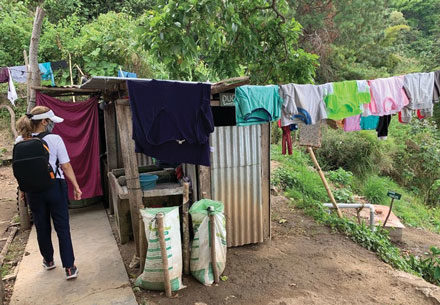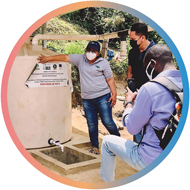2022 Charting a Career Path in Global Affairs
THIS GUIDE IS NO LONGER ACTIVE. For the current FP Guide, click here.
Texas A&M University, The Bush School of Government & Public Service
Understanding Conflict and Development in Local and Global Politics

For students in the Bush School of Government & Public Service at Texas A&M University who grew up after 9/11, courses in the Conflict and Development concentration help them understand how the United States became embroiled in wars in Iraq, Afghanistan, Yemen, and elsewhere.
“I think our students are in a difficult place, struggling to understand the conflicts that have been part of the past 20 years of American history,” says Dr. Reyko Huang, associate professor in the Bush School’s Department of International Affairs and coordinator of the concentration. “Courses within the Conflict and Development concentration offer the theories, knowledge, and analytical tools to enable students to understand the local-level dynamics and the geopolitics of contemporary conflicts.”
Dr. Huang includes a simulation in her Contemporary Civil Wars course, assigning her students to negotiate a peace agreement. They spend the semester learning about the politics of armed conflicts, studying why ordinary people take up arms against their government, how they procure weapons and mobilize their fellow citizens, and how foreign intervention alters dynamics on the ground.

“Courses within the Conflict and Development concentration offer the theories, knowledge, and analytical tools to enable students to understand the local-level dynamics and the geopolitics of contemporary conflicts.” –Dr. Reyko Huang, Associate Professor, Bush School of Government & Public Service, Texas A&M University
Students are assigned to teams that represent different parties in an ongoing conflict, including government negotiators, an armed rebel group, and external actors, such as the US government and the United Nations. The students negotiate for three hours, sometimes reaching an agreement. But sometimes students “aren’t willing to budge” and the negotiations fail, reflecting the reality that many end without an agreement, Dr. Huang explains.
Dr. Huang notes that students who earn the Master of International Affairs often land jobs in the federal government, including with the Foreign Service or the US Agency for International Development. International students usually return to their home countries, taking jobs in the government or foreign ministry.
Students in the International Affairs Department choose two concentrations from over a dozen offered in their two primary tracks: National Security and Diplomacy or International Development and Economic Policy. They then complete at least three courses in their chosen concentrations. The Conflict and Development courses are popular because they satisfy requirements for either track.
The multidisciplinary Bush School faculty comprises political scientists, economists, and historians, as well as practitioners with decades of experience in the policy world. Classes are small and interactive, with an emphasis on critical thinking and debate, so students can learn to consider multiple perspectives, advance an argument, and work as a team, Dr. Huang says.
 Capstone Course Features On-the-Ground Experience in Public Policy Research
Capstone Course Features On-the-Ground Experience in Public Policy Research
Last March, Dr. C. Silva Hamie, instructional associate professor in the Department of International Affairs, and a team of students traveled to El Salvador, where they interviewed rural laborers and representatives of non-governmental organizations (NGOs). Their goal: to examine the effectiveness and impact of NGOs’ disaster risk reduction in the Central American country.
>>>“We wanted to find out what NGOs are able to accomplish or not, given the gang violence and challenging political and economic circumstances in El Salvador,” Dr. Hamie explains.
>>>The experience is part of the Bush School’s required capstone course, where students learn to supervise, conduct, and evaluate large-scale public policy research. “Students need to see what’s happening on the ground to have an impact on policy making,” Dr. Hamie says.
Contact
https://bush.tamu.edu
[email protected]
979-862-3469![]()
Contents
- 2022 Charting a Career Path in Global Affairs
- Johns Hopkins University School of Advanced International Studies
- George Mason University, Schar School of Policy and Government
- University of Notre Dame, Keough School of Global Affairs
- University of Miami, Master of Arts in International Administration
- School of Diplomacy and International Relations at Seton Hall University
- Texas A&M University, The Bush School of Government & Public Service
- Clinton School of Public Service at the University of Arkansas
- Florida International University, Steven J. Green School of International & Public Affairs
- Princeton University, Princeton School of Public and International Affairs
- The Fletcher School, Tufts University

